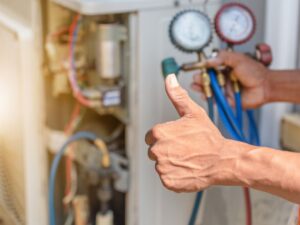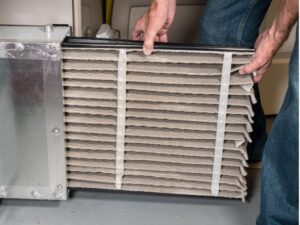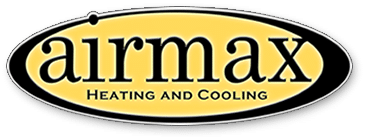How to Improve the Indoor Air Quality in Your Home
Originally published in April 28, 2019, updated in January 10, 2022.
How is the indoor air quality (IAQ) in your Wilmington, North Carolina, home? Most indoor air pollution is invisible. However, its effects are very real. Poor indoor air quality can cause frequent headaches, sinus problems, fatigue, sniffling, sneezing, shortness of breath and dizziness. It can make allergies worse and aggravate existing respiratory conditions like COPD and asthma. The good news is that you don’t have to live with poor indoor air quality. Here are seven easy ways to clean up your indoor air:
1. Keep Your Floors and Rugs Clean
Counteract pet dander with frequent vacuuming and mopping. Vacuums with a HEPA filter are best and can reduce pollen and dust mites as well. Mopping hard floors after vacuuming carpet will remove any lingering dust, dander and dirt.
2. Humidity Levels Affect Indoor Air Quality
Homes with high humidity are especially prone to poor IAQ. Dripping faucets and leaky pipes can cause a host of issues. Viruses and bacteria, especially those that cause respiratory infections, flourish in moist environments. A hygrometer is an inexpensive gadget that measures indoor relative humidity. Readings from 40 to 50 percent are considered ideal and are best for controlling indoor air pollution.
3. Avoid Artificially Scented Products
Synthetic fragrances commonly used in air fresheners and laundry products can contain 20 or more different kinds of VOCs (volatile organic compounds). Some VOCs are even classified as toxic or hazardous, but the product manufacturers are not required to list the ingredients; only the word “fragrance” must be listed.
4. Schedule HVAC Maintenance
HVAC equipment can pollute indoor air if it’s not cleaned and serviced at least once per year, preferably twice annually. Clogs in the condensate drain line can create bacterial slime in the condensate drain pan. Ductwork can also become coated with contaminants that blow into your home when your HVAC cycles on. Have your HVAC serviced annually. Ducts should be inspected every few years and cleaned as needed.
5. Change HVAC Filters Regularly to Improve Indoor Air Quality
HVAC filters trap particles, pet hair and other airborne contaminants before they can get inside the system. Clogged filters can negatively impact IAQ. All of the air in your home travels through that dirty filter over and over every day. Operating your HVAC with a clogged filter is one of the worst things you can do for IAQ. This is especially true if someone in your family has a breathing disorder. If you have pets, brush them daily to reduce dander and pet hair. That helps to decrease the load on your filter.
6. Use Beeswax Candles to Clean Indoor Air
When beeswax candles burn, they release negative ions. Indoor air contaminants have a positive charge. When beeswax candles are burning and releasing negative ions, the positively charged ions of the contaminants get sucked into the candles or are removed from suspension. These candles behave like air purifiers. They’re all natural, and they smell good, too.
7. Install an Air Cleaning System
Insufficient ventilation is responsible for many IAQ problems. A whole-house ventilator can bring in fresh air while removing stuffy and polluted air. UV lights installed in your ductwork or by AC coils can kill contaminants like viruses and bacteria. HEPA filters remove dust, bacteria, dander, pollen and mites. HEPA filters do not, however, remove gasses, fumes, smoke or odors. Charcoal/carbon filters remove smoke, fumes, odors and gases but not dust or allergens. Use HEPA filters in the air purifier with a charcoal or carbon filter for best results.
If you’re concerned about IAQ, have your air tested by an indoor air quality contractor like Airmax Heating & Cooling. Call us today to learn more.
You May Also Like

When’s the Best Time to Service My Hampstead, NC, Heat Pump?
Heat pump maintenance timing separates homeowners who enjoy consistent comfort from those scrambling during emergency breakdowns. In Hampstead’s coastal climate, where systems… Continue Reading When’s the Best Time to Service My Hampstead, NC, Heat Pump?…

Click, Rattle, Bang: Are These Furnace Noises Normal?
While some furnace noises signal normal operation, others warn of problems that could leave you shivering or facing costly repairs. Understanding the… Continue Reading Click, Rattle, Bang: Are These Furnace Noises Normal?…

What Are the Benefits of Booking a Furnace Tuneup in Leland, NC?
When winter’s chill settles over Leland’s coastal neighborhoods and fireplaces begin crackling to life, your furnace quietly assumes its most critical role… Continue Reading What Are the Benefits of Booking a Furnace Tuneup in Leland, NC?…
